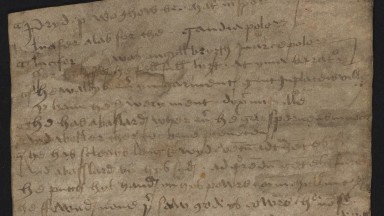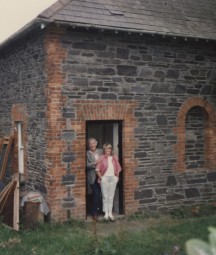While people may be more familiar with these modern authors and their works, they may be less familiar with older literary material held by the library. And until recently, so was I. While going through the card index for deeds in the Ormond collection held by the library my eye was caught by a curious reference to ‘Anglo-Irish verses’ recorded for D. 1435 (it’s call number). I was not aware of their being poetry among the austere legal and financial records in this magnificent collection of medieval manuscripts, so this piqued my interest. The document I saw was not recorded on either the online catalogue of the library nor was it included in the Calendar of Ormond Deeds produced by that indefatigable Irish medievalist Edmund Curtis.
This raised exciting possibilities, so I ordered the manuscript to see what it was. Upon picking up the faded manuscript I saw the words ‘Gracius and gay’ and realised it contained two pieces of poetry. The first was written in English and Latin and the second in English.
Looking again at the brown envelope which contained the poetry, I saw a reference written on it to an edition and translation of this document – published in 1933, when the item was still held in Kilkenny Castle.[1] This dashed any hopes of making a new ‘discovery’. This invaluable edition notes that the two poems were likely written in England during 1450-1500 and were written in two distinct dialects of the English Midlands.
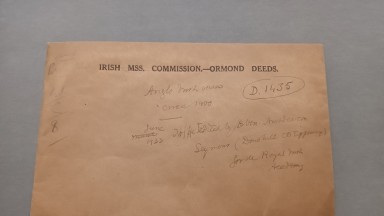
The brown envelope which housed the manuscript
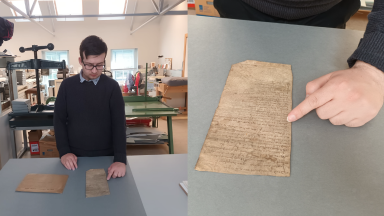
Dr Patrick McDonagh reading D. 1435 in the conservation studio
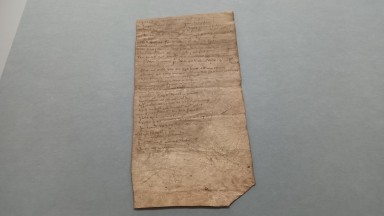
D. 1435 in the conservation studio
How they ended up in the Ormond Deeds is unclear though it is worth stressing that the medieval earls of Ormond owned lands in England. It may well have been circulated among the administrative personnel who served the Butler earls across their estates.
These two poems are perhaps the two oldest poems in the English language held by the National Library of Ireland and – for that reason alone – deserve greater prominence. Reflecting on the eternal nature of the human condition and its complex needs and desires despite an ever-changing world, we will finish by quoting the translation (or modernisation) of the second poem:
Graceful and gay, on her is set all my thought. Unless she have pity on me to-day she will bring me to death. Her fingers are long and slender, her arms are round and firm, her mouth as sweet as licorice; on her is set all my thought. Her eyes are fair and gray, her brows are well arched, her colour as red as rose in May, her waist is slender and noble. She is sweet under sheet; I love her (and) no other. She has my heart in her keeping in whatever lands she travels. Speak now, I pray; on thee my love is set. Kiss me once ere I wend on my way.
[1] St. John D. Seymour, ‘Three Medieval Poems from Kilkenny’ in Proceedings of the Royal Irish Academy: Archaeology, Culture, History, Literature, 1932-1934, Vol. 41, pp. 205-209.
